The Magic Flute Blu-ray Movie
HomeThe Magic Flute Blu-ray Movie 
TrollflöjtenCriterion | 1975 | 138 min | Not rated | Mar 12, 2019
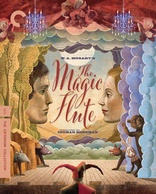
Movie rating
7.3 | / 10 |
Blu-ray rating
| Users | 0.0 | |
| Reviewer | 4.5 | |
| Overall | 4.5 |
Overview
The Magic Flute (1975)
The Queen of the Night enlists a handsome prince named Tamino to rescue her beautiful kidnapped daughter, Princess Pamina. Aided by the lovelorn bird hunter Papageno and a magical flute that holds the power to change the hearts of men, young Tamino embarks on a quest for true love.
Starring: Josef Köstlinger, Irma Urrila, Håkan Hagegård, Elisabeth Erikson, Britt-Marie AruhnDirector: Ingmar Bergman
| Foreign | Uncertain |
| Romance | Uncertain |
| Fantasy | Uncertain |
| Musical | Uncertain |
Specifications
Video
Video codec: MPEG-4 AVC
Video resolution: 1080p
Aspect ratio: 1.37:1
Original aspect ratio: 1.37:1
Audio
Swedish: LPCM 2.0
Subtitles
English
Discs
Blu-ray Disc
Single disc (1 BD)
Playback
Region A (locked)
Review
Rating summary
| Movie | 4.5 | |
| Video | 5.0 | |
| Audio | 5.0 | |
| Extras | 2.5 | |
| Overall | 4.5 |
The Magic Flute Blu-ray Movie Review
Reviewed by Jeffrey Kauffman April 3, 2019One of the great if perhaps subliminal ironies in Ingmar Bergman’s long and legendary career is that while he was arguably among the most “cinematic” of directors, never shying away from presentational ingenuities that the medium of film offered to him, he was also a very successful theater director as well. The two skill sets don’t necessarily mix, and for anyone questioning that assertion, I’d point them to the evisceration of some guy named Vincente Minnelli or something like that in William Goldman’s wonderful (if occasionally un-PC) account of the 1967-68 year on Broadway, The Season. Goldman spends a chapter on a megaflop musical no one (or at least very few) remembers nowadays, Mata Hari, laying much of the blame on directorial missteps by Minnelli, who, according to Goldman anyway, simply didn’t understand the difference between directing a stage show and directing a film. Perhaps because Bergman managed to be successful in both idioms, his film of The Magic Flute is a kind of fascinating “combo platter” that combines elements of a “filmed stage show” along with more “meta” aspects that clearly belong more firmly to the film world. In that respect, The Magic Flute brought to mind a comment by Mel Brooks in the recently reviewed The Great Buster: A Celebration, where Brooks states that one of the most notable things about Buster Keaton’s films, and something that Brooks himself sought to emulate in his films, is how Keaton repeatedly draws attention to the fact that an audience is watching a film. Bergman does much the same in The Magic Flute, but quite interestingly he also draws attention to the fact that two audiences (one in the film and any “outside” viewer) are also watching a play (or opera, to be perfectly accurate).
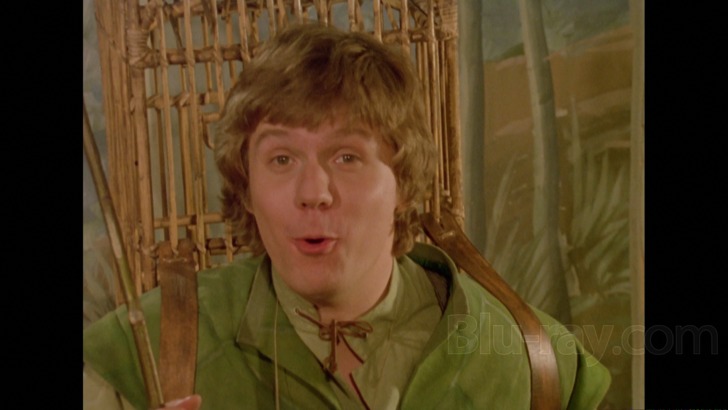
In a kind of fitting moment of synchronicity, Alain Resnais’ Mélo is coming up soon in my review queue, and there’s a rather interesting supplement on that disc that actually goes into the disconnect between theater and film, since Resnais’ film was derided at the time of its release for being supposedly “too blatantly theatrical”. It’s perhaps helpful to put The Magic Flute into the category of “filmed stage play”, since Bergman really makes no bones about the “film” being a stage show, not to mention the fact that Bergman actually seems to delight in revealing some of the “technology” utilized to make the story come alive, in terms of things like scene changes and the like. And yet — The Magic Flute, if it can be properly categorized as a “filmed stage play” (and there are no doubt some, maybe many, who would argue with such a categorization), is not only a “filmed stage play,” as any of Bergman’s repeated “meta” emphases make clear.
Of course, as fans of one of Mozart's most beloved operas will probably already know, The Magic Flute comes replete with its own "meta" aspects, including what might be termed surprisingly overt references to Freemasonry (surprising in that Freemasonry was considered to be a "secret society", especially in days of yore). But the appealing thing about The Magic Flute is that you don't need to know and/or care one whit about Freemasonry in order to understand and enjoy the almost fairy tale like quality of the story. And certainly the music speaks (or sings) for itself, bypassing whatever "rationality" might be hinted at by that iconic Freemason square and compasses symbol.
For those unacquainted with the plot of The Magic Flute, I refer you to the summary Svet provided in his now long ago Mozart: Die Zauberflöte Blu-ray review of a live opera performance. What gives this production some of its charm is Bergman's emphasis on old world stagecraft. He had wanted to film in Drottningholm's ornate baroque theater, but that was deemed too perilous due to the age of the facility. A complete recreation of the rather smallish stage was built for the film, and what amounts to 18th or 19th century stagecraft is employed throughout. There is a definite "Scandinavian" feeling that may make this feel decidedly more northern than its putative setting in Egypt, but Bergman hews quite closely to the original libretto (occasional variances will be noted by the most devoted opera fans).
While this production is often effortlessly ebullient, there are some issues some may have with either the performances or Bergman’s directorial choices. Bergman was on record stating that due to the intimacy of the film medium, he didn’t feel he really needed “big” voices, and operatic curmudgeons (snobs?) perusing the cast list may feel it really doesn’t provide any true opera superstars. There’s admittedly an evocative warmth to almost all of the singing, but even Birgit Nordin’s Queen of the Night, certainly one of the “showiest” soprano roles in the entirety of opera, may not strike some as energetic enough. Stylistically, Bergman’s decision to repeatedly cut away to the audience, including one little girl’s face he seems intent on featuring, may be too disjunctive for some.
Note: For fans of Svet’s reviews of Criterion releases, fear not — he sent me this standalone release as my hunch is he may be posting his own review as part of the humongous Ingmar Bergman's Cinema set.
The Magic Flute Blu-ray Movie, Video Quality 
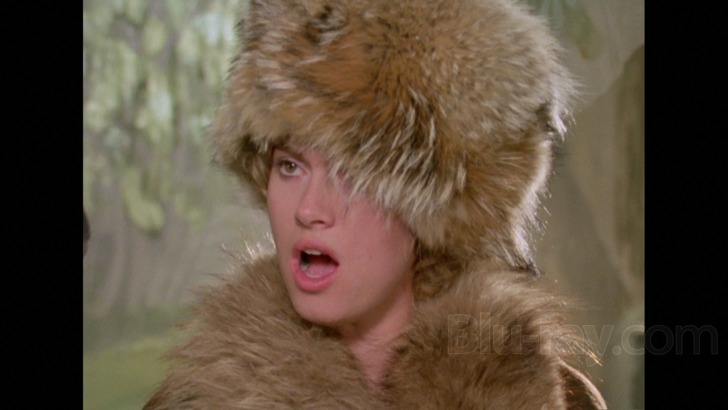
The Magic Flute is presented on Blu-ray courtesy of Criterion with an AVC encoded 1080p transfer in 1.37:1. The insert leaflet included with this release contains the following information on the transfer:
The Magic Flute is presented in its original aspect ratio of 1.37:1. On widescreen televisions, black bars will appear on the left and right of the image to maintain the proper screen format. This new digital transfer was created in 2K resolution on a Scanity film scanner from a 35mm interpositive and restored by the Swedish Film Institute. The stereo soundtrack was remastered from the 35mm optical track.Fans of the film will know that Bergman and cinematographer Sven Nykvist shot the opera on 16mm, with theatrical exhibitions subsequent to the initial television broadcast offering 35mm blowups. I'm kind of curious about what might have happened to the negative, but I haven't been able to find any authoritative data. One way or the other, the IP utilized was either in great condition or has been restored to appear so, as there are no real evident signs of age related wear or tear. The film's almost honey colored stage lighting is beautifully recreated here, and fine detail on elements like costumes and props is consistently engaging. Grain resolves naturally throughout the presentation and I noticed absolutely no compression issues.
The Magic Flute Blu-ray Movie, Audio Quality 
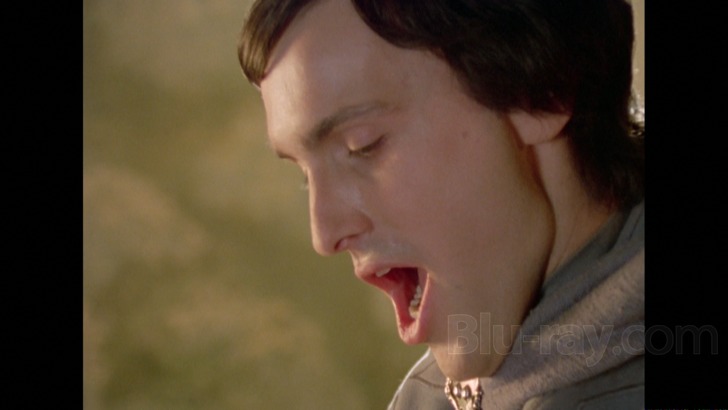
The Magic Flute made history of a kind by being, according to Peter Cowie, the very first made for television production with a stereo soundtrack. The LPCM 2.0 rendering on this disc is beautifully burnished, with a really warm, inviting sound from the orchestra, and excellent balance between soloists and the massed orchestral forces. Even the densest choral sections have a distinctive and beautiful clarity. It's kind of fun to hear this piece in Swedish, which may provide some "sidebar" entertainment for fans of the original German language version.
The Magic Flute Blu-ray Movie, Special Features and Extras 
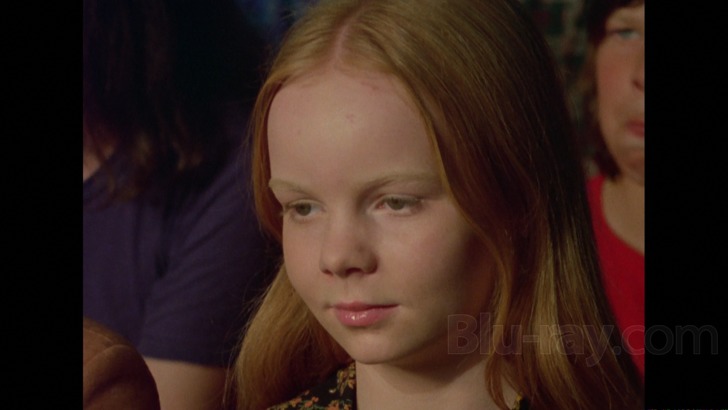
- Ingmar Bergman (1080i; 29:27) is a television interview conducted by Sigvard Hammard, which was broadcast in December 1974, just a few days before the television airing of the film in Sweden, and which focuses on the film and the opera. In Swedish with English subtitles.
- Peter Cowie (1080p; 18:15) offers an interesting assessment of the film and its theatrical proclivities.
- Tystnad! Tagning! Trollflöjten! (1080p; 1:05:27) is a documentary about the filming which was broadcast on Swedish television just a few days after the original broadcast of the film. In Swedish with English subtitles.
The Magic Flute Blu-ray Movie, Overall Score and Recommendation 

In his interview included on this disc as a supplement, Bergman laments how people seem to think that opera is boring. That's perhaps one reason by Bergman approaches The Magic Flute from a number of different perspectives, letting the audience (of the film, that is) view the property through a number of different prisms, including the "simple" aspect of just enjoying the stage performance unfold, but also seeing actors goofing off backstage and the like. That very approach may subliminally suggest the layers of meaning that The Magic Flute has always offered, but it may also have been a "mere" efficacious attempt to keep things from getting stale. This is certainly one of the most unique offerings in Bergman's monolithic output, and even those who wouldn't know an aria from a recitative may find a lot to enjoy here. Criterion provides a release with its typically excellent technical merits, and while supplements are incredibly bountiful, they're extremely enjoyable. Highly recommended.
Similar titles
Similar titles you might also like

Fårö Document
Fårödokument
1970

Fårö Document 1979
Fårödokument 1979
1979

All These Women
För att inte tala om alla dessa kvinnor
1964

Saraband
2003

Crisis
Kris
1946

Smiles of a Summer Night
Sommarnattens leende
1955

The Passion of Anna
En passion
1969

A Lesson in Love
En lektion i kärlek
1954

After the Rehearsal
Efter repetitionen
1984

Port of Call
Hamnstad
1948

The Rite
Riten / The Ritual
1969

To Joy
Till glädje
1950

The Devil's Eye
Djävulens öga
1960

Thirst
Törst
1949

A Ship to India
Skepp till Indialand / A Ship Bound for India
1947

Brink of Life
Nära livet
1958

Dreams
Kvinnodröm
1955

Summer Interlude
Sommarlek
1951

Sawdust and Tinsel
Gycklarnas afton
1953

Summer with Monika
Sommaren med Monika | Original Uncut version
1953
